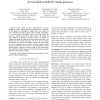686 search results - page 12 / 138 » Empirical Studies in Reverse Engineering |
BIOCOMP
2008
13 years 11 months ago
2008
Background: Inferring a gene regulatory network (GRN) from high throughput biological data is often an under-determined problem and is a challenging task due to the following reas...
WCRE
2009
IEEE
14 years 4 months ago
2009
IEEE
—Code smells are poor implementation choices, thought to make object-oriented systems hard to maintain. In this study, we investigate if classes with code smells are more change-...
CHES
2009
Springer
14 years 10 months ago
2009
Springer
? This paper gives an overview of the place of reverse engineering (RE) in the semiconductor industry, and the techniques used to obtain information from semiconductor products. Th...
IWPC
2007
IEEE
14 years 4 months ago
2007
IEEE
A commonly used strategy to address the scalability challenge in object-oriented reverse engineering is to synthesize coarse-grained representations, such as package diagrams. How...
ICSE
1999
IEEE-ACM
14 years 2 months ago
1999
IEEE-ACM
Many reverse-engineering tools have been developed to detract representations from source code. Yet, most of these tools completely ignore recovery of the all-important rationale ...

